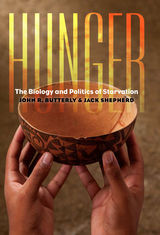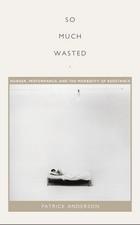2 books about Starvation

Hunger
The Biology and Politics of Starvation
John R. Butterly and Jack Shepherd
Dartmouth College Press, 2010
The Universal Declaration of Human Rights, adopted by the United Nations in 1948, recognizes the individual’s right “to a standard of living adequate for the health and wellbeing of himself and his family, including food, clothing, housing, and medical care.” More than sixty years later, despite the rapid advancement of science and technology and the proliferation of humanitarian efforts, inadequate nutrition remains a major health and social problem worldwide. Food insecurity—chronic malnutrition, persistent hunger, even starvation—still afflicts more than one in seven of the world’s people. As Butterly and Shepherd show, hunger is not the result of inadequate resources and technologies; rather, its cause is a lack of political will to ensure that all people have access to the food to which they are entitled—food distributed safely, fairly, and equitably. Using a cross-disciplinary approach rooted in both medicine and social science to address this crucial issue, the authors provide in-depth coverage of the biology of human nutrition; malnutrition and associated health-related factors; political theories of inadequate nutrition and famine; historical-political behaviors that have led to famine in the past; and the current political behaviors that cause hunger and malnutrition to remain a major health problem today.
[more]

So Much Wasted
Hunger, Performance, and the Morbidity of Resistance
Patrick Anderson
Duke University Press, 2010
In So Much Wasted, Patrick Anderson analyzes self-starvation as a significant mode of staging political arguments across the institutional domains of the clinic, the gallery, and the prison. Homing in on those who starve themselves for various reasons and the cultural and political contexts in which they do so, he examines the diagnostic history of anorexia nervosa, fasts staged by artists including Ana Mendieta and Marina Abramović, and a hunger strike initiated by Turkish prisoners. Anderson explores what it means for the clinic, the gallery, and the prison when one performs a refusal to consume as a strategy of negation or resistance, and the ways that self-starvation, as a project of refusal aimed, however unconsciously, toward death, produces violence, suffering, disappearance, and loss differently from other practices. Drawing on the work of Martin Heidegger, Sigmund Freud, Giorgio Agamben, Peggy Phelan, and others, he considers how the subject of self-starvation is refigured in relation to larger institutional and ideological drives, including those of the state. The ontological significance of performance as disappearance constitutes what Anderson calls the “politics of morbidity,” the embodied, interventional embrace of mortality and disappearance not as destructive, but rather as radically productive stagings of subject formations in which subjectivity and objecthood, presence and absence, and life and death are intertwined.
[more]
READERS
Browse our collection.
PUBLISHERS
See BiblioVault's publisher services.
STUDENT SERVICES
Files for college accessibility offices.
UChicago Accessibility Resources
home | accessibility | search | about | contact us
BiblioVault ® 2001 - 2024
The University of Chicago Press









